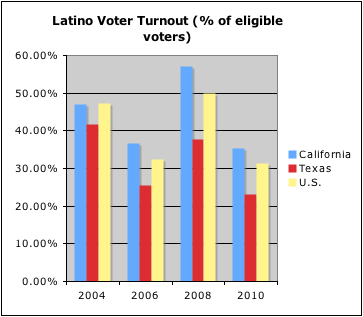Texas Democratic Party Defends Its Record on Latinos (I Respond)

A few days ago, Anthony Gutierrez, an official with the Texas Democratic Party, took me to task for what he called my “completely absurd” theory about Republicans potentially gaining ground with Latinos in Texas. I can’t let his rejoinder go unremarked, primarily because he misstates what I wrote. Gutierrez wrote:
Mr. Wilder’s theory of Republican success among Latinos is based upon three Latino party-switchers who recently became Republicans. While I personally believe his correlation is completely absurd, I’m willing to concede that it won’t be formally absurd for about a month. But on May 29th at 7pm, his argument will officially fall apart because at least one but likely all three of his “success stories” will fail to make it out of their party primary.
Gutierrez never states which three Latino party-switchers he’s talking about and I actually referred to only two in my column — former state Rep. Aaron Peña who retired after redistricting handed him a district unwinnable for a Republican and J.M. Lozano, a freshman from Kingsville who switched to the Republican side in early March. I assume the third party-switcher is Miriam Martinez, a former TV reporter who’s been in search of both a district and a party for months.
So, yes, “at least one” of these turncoats will lose. He (Peña) already has. I hardly see how this proves or disproves anything. And I doubt anyone will be shocked if GOP voters favor the two Anglos in the House District 43 GOP primary over Lozano, an unaccomplished freshman who ran in 2010 on the platform of “get[ting] rid of all the closet Republicans from the Democratic Party.” As I readily concede in my column, the Texas Republican base has a serious Latino-phobia problem.
However, the upcoming primaries aren’t the beginning or the end of the story of Latino voters in Texas. Were it so simple! My “theory”—really more of an observation—does not rest on the outcome of two primary races. As I stated in the column, the non-Neanderthals in the Texas GOP are now playing a “long game” for Latinos.
(For insight, see this 4,300-word article on Juan Hernandez, a Hispanic Republican who’s trying to bridge the gap between the GOP and Latinos, by my colleague Melissa del Bosque.)
They don’t need to win every race, or even most of them, to achieve their goals. It’s likely that for now they’ll lose more than they win. But they don’t need to suddenly lock down 50+ percent of the Hispanic electorate. The Republicans need make only steady, incremental gains over time to keep their lock on power. The importance of the party-switchers, while it certainly does help in getting conservative legislation passed in the Legislature, is mostly symbolic. You have to start somewhere, and electing a handful of minority Latinos and African-Americans to the Legislature as Republicans and welcoming two or three high-profile defectors is better than nothing.
Ironically, it’s some Democrats who’ve said that things will work out for them “in the long run.” We’ve been waiting for at least a decade now for the “inevitability” of Latinos turning Texas into a blue state. Remember this?
But Gutierrez correctly points out that Latinos are hardly warming to the GOP message.
As cited in the Fort Worth Star Telegram, a Univision/ABC/Latino Decision poll showed that 73% of Hispanic voters said Republicans “don’t care” about Hispanic voters or are “hostile.” Additionally, 55% of Hispanic Republicans said they felt like their own Party ignored them.
Those sentiments are the inevitable product of hateful Republican rhetoric and misguided policies like the $5.4 billion Republicans cut from Texas public education, disproportionately harming Latino communities.
I don’t disagree. And Democrats should thank their lucky stars that the haters still have a grip on the GOP, at least from a strategic point of view. So, there is that. But is it really that crazy to think that things might change? Historical political realignments can and do happen. At a minimum, it’s important to recognize that there are folks, many of them Hispanic, in the conservative world who are working diligently to make the Republican party more open to Hispanics.
Finally, Gutierrez acknowledges what’s obvious to any casual observer of Texas politics: The completely non-theoretical fact that Latino voter turnout is very low in this state and it harms Democrats. Gutierrez then says:
But knowing that we need to target Latinos has never been our problem and in fact, when we have the resources, Texas Democrats are very successful in downballot races by turning out Latinos.
And there’s the rub: in Texas we have 254 counties, 20 media markets and an awful lot of real estate to cover. Putting the kind of Latino turnout programs you see in swing states like Nevada or Colorado in place in Texas would carry a price tag in the tens of millions of dollars.
It’s telling that Gutierrez doesn’t mention California, a large, diverse state that has much higher Latino turnout rates than Texas. Like, way higher.

Finally, Gutierrez points to the Promesa Project, a Democratic Party initiative which I flagged in my column, as an effort to get more Latinos plugged into Democratic politics.
We believe that utilizing online outreach layered on top of traditional grassroots techniques will allow us to efficiently increase our vote share among older Latinos, boost Latino turnout among younger Latinos and simultaneously begin an engagement process that will build out Party towards the future.
Time will obviously tell us whose theory is correct. Our [Promesa] project began last year and we’ll be proud to stand by our results in November. Mr. Wilder’s theory will face a crucial test on May 29th and we’ll be anxiously watching to see how his Republican “success stories” fare.
While I agree that “time will tell,” it’s the November election, not the primary, that really matters. We will know then whether the Democrats have gone another election cycle without raising Latino voter turnout.


